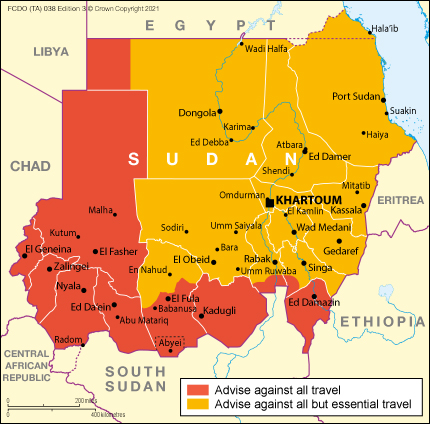Sudan
Summary

For security reasons the FCDO advises against all travel to:
- the Darfur states
- the Abyei Region
- South Kordofan and Blue Nile states
- the southern area of West Kordofan state that was previously part of South Kordofan, as shown on the map
- within 50km of the border with South Sudan in White Nile and Sennar states
- within 200km of the border with Libya
The FCDO advises against all but essential travel to the remainder of Sudan
British Embassy Khartoum are following developments resulting from the ongoing political crisis after a military coup on 25 October 2021. Protests are taking place across the country. Internet and telephone services remain unreliable and may be blocked or suspended at short notice. There is a heightened risk that the situation in Khartoum and elsewhere in Sudan could deteriorate rapidly.
Calls for protests across the country continue and can occur at short notice. Roads may subsequently be blocked by protesters or security forces. You should avoid all unessential movement. If travel is essential, monitor media coverage, avoid demonstrations and follow the advice of the local authorities. Large-scale protests have taken place regularly across the country since 25 October 2021. A number of people have been killed as a result of security forces’ response to protests and many more injured. Stay away from areas where demonstrations are planned. If you unexpectedly meet a demonstration, leave the area straight away. See Safety and security section
The Embassy continues to carry out essential work and we continue to offer consular services online and by telephone 24 hours a day, 7 days a week. If you need assistance, call + 249 (0) 156 77 5500 / +44 (0)1908 516666. When calling, you may hear a message stating that our offices are closed. If so, stay on the line and select the option for ‘calling about an emergency involving a British national’ to speak to an officer.
Consular support is severely limited in parts of Sudan where the FCDO has existing advice against all travel and all but essential travel (as set out above). The British Embassy no longer registers British nationals in Sudan and the capacity of the British Embassy to help in times of crisis may be limited. You should consider your own travel arrangements carefully and make sure you have up-to-date travel documents and visas in case you need to leave at short notice. See this crisis guidance page for more information about the precautions you should take in the event of a crisis and the help and support the British Embassy can provide.
COVID-19 entry restrictions for Sudan
Before you travel, check the ‘Entry requirements’ section for Sudan’s current entry restrictions and requirements. These may change with little warning. Monitor this advice for the latest updates and stay in contact with your travel provider.
Travelling from and returning to the UK
Check what you must do to travel abroad and return to England, Scotland, Wales or Northern Ireland.
If you plan to pass through another country to return to the UK, check the travel advice for the country you’re transiting. If you will pass through a red list country, book your hotel quarantine package before travelling to the UK.
If you’re still planning travel to Sudan, find out what you need to know about coronavirus there in the Coronavirus section.
During the COVID-19 pandemic, it is more important than ever to get travel insurance and check it provides sufficient cover. See the FCDO’s guidance on foreign travel insurance.
For information about COVID-19 vaccines, see the Coronavirus page.
Terrorists are likely to try to carry out attacks in Sudan. Attacks could be indiscriminate, including in places frequented by expatriates and foreign travellers. See Terrorism
You will need a visa to visit Sudan. See Visas
If you’re abroad and you need emergency help from the UK government, contact the nearest British embassy, consulate or high commission.
The Overseas Business Risk service offers information and advice for British companies operating overseas on how to manage political, economic, and business security-related risks.